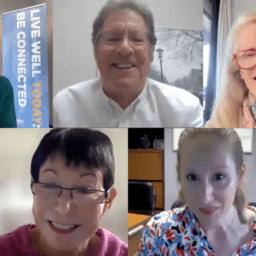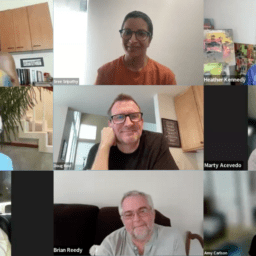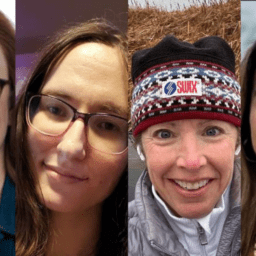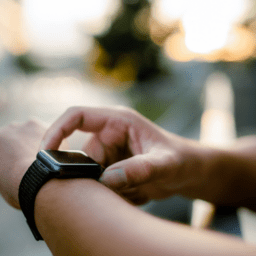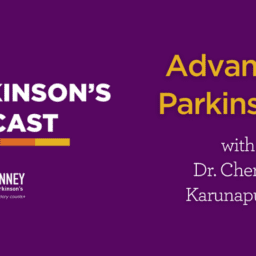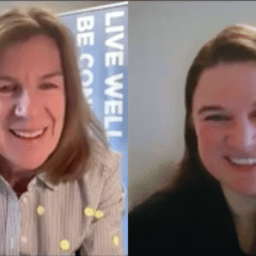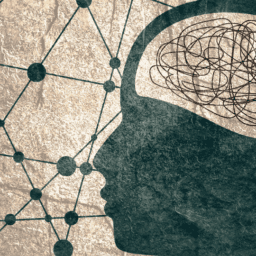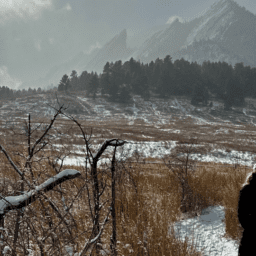During the July 2023 Care Partner Meetup, the panel included the Foundation’s Executive Director, Polly Dawkins; Foundation Ambassador and Parkinson’s Care Partner Pat Donahoo; and Connie Carpenter Phinney, who wrote the follow-up below.
NOTES FROM this month’s meetup
Written by Connie Carpenter Phinney
The July meetup started with a simple question posed by fellow panelist and Foundation Ambassador Pat Donahoo: What are you doing that is working for you right now?
Pat started us off by saying, “When I first asked the question, ‘What’s working for us now?’, we had a lot of different things working for us, but since then, things aren’t working. And so what’s working for us now has changed because we’re going through some changes. We’re reinventing…and adapting.”
The key word for Pat and his person with Parkinson’s, Cyd, is adapting. They are going through medication changes to help control Cyd’s dyskinesias, and they recently moved out of the Las Vegas heat for a brief respite in California at his brother’s house. An example of another adaptation is Pat will be teaching at a new school. Pat also noted that his brother modified Cyd’s recumbent bike to stop the chain from repeatedly falling off—another adaptation win. Adapting is really a good word and a great way to approach caring for a person with Parkinson’s.
Dealing with the Summer Heat: Hydration and Sun Care
One of our listeners asked about the heat and how it affects someone with Parkinson’s. We reminded everyone to stay hydrated and try to provide their own shade—an umbrella is a great option. Hydration is essential in many ways, such as protecting against dizziness and helping stabilize cognition.
I also noted that as we age, we may not notice when we are becoming dehydrated, so it’s important to push fluids. To make the fluids more appealing, try using a rehydration mix. Our favorite is from our friends and Foundation supporters at Skratch Labs. We like to mix it with some unsweetened hibiscus tea. Hydration mixes replace vital electrolytes, and the hibiscus tea adds some nice flavor. Put hibiscus tea bags in cold water and let steep for an hour. Other resources about nutrition and hydration are available here.
Also, note that people with Parkinson’s are more likely to get sunburned, so please don’t forget the sunscreen.
Questions from Listeners and Other Ideas
Listeners weighed in on several things that are working for them now, including a focus on humor, and how they are adapting when things don’t work anymore. When all else fails, make faces in the mirror and/or watch silly sitcoms on TV. One listener talked about keeping a list of “fun things to do,” which they refer to when looking for an outlet. Great idea!
Another listener asked about respite care. We noted that short-term respites can range from 15 minutes to a few hours, and longer-term respites can be several days or more. Adapting can be difficult in this situation. One listener said he received a grant from his town for $ 3,500, which enabled him to find care for his person and take a week off.
This led to a conversation about learning how to ask for help and where to find help. We discussed how sometimes newer friends can be more likely to be helpful, and Pat told a story about how a helpful neighbor fixed a lawn sprinkler for them when he was out of town without being asked.
As I’ve done many times, I noted that we must learn how to ask for help, and our person with Parkinson’s has to be willing (or trained) to accept it. This is an ongoing process for all of us. Caregiver.org has helpful resources, and we have resources that can help as well, including tips for building a strong care partner team.
We also received a question about what to do when adult children don’t seem to want to offer any care or even ask how their parent is doing. This is a tough one, but it is not unusual. We suggested adapting by informing adult children of doctor visits and providing updates or “progress reports.” Pat said he shares videos of his wife so they can see where she struggles, particularly with movement. Those same videos can also be shared with the doctor at appointments.
Sam Narciso, who works for the Foundation and moderates the Care Partner Meetup chat by providing links, is the adult child of a person with Parkinson’s. She says, “Take the time to tell your children what is happening; they want to help!”
Pat also shared how they recently added a wheelchair to their toolkit because it gives them comfort to know it’s available and because, at times, they’ve needed it. He used the example of how his wife pushed the chair to the beach but gladly rode in it back to their car when she got tired and her meds weren’t working properly. They also have walking poles to use as needed.
Someone mentioned in the chat that counseling was working for them. We discussed how hard it was to find a good counselor but how important they can be for couples and individuals.
My “thing that is working for me” is that I recently changed my primary care doctor. I talked about how grateful I was to be taking good care of myself and my skill at adapting, and having an expert asking me all the right questions after letting my health management suffer during the height of the pandemic. I likened it to deferred maintenance on a house. We must keep caring for ourselves, so please take care of YOU!
Other things that are working for people are:
- Taking walks either alone or together (or a mix of the two)
- Taking a road trip and enjoying each other’s company
- Sticking to a schedule
- Finding a sleep environment that works (especially if REM sleep disorder is in play)
I brought up my recent visit to the World Parkinson’s Congress, where I attended an informative talk on intimacy given by sex therapist Gila Bronner, MPH, MSW, CST from Tel Aviv Medical Center, and we discussed providing more resources and perhaps dedicating an entire meetup to intimacy with a guest expert. We defined intimacy as the ability to maintain connection via touch. I relayed the information from the talk about how just a longer daily hug (more than 30 seconds) or asking for (and receiving) a small massage to your shoulders or hands can be pleasurable. Cultivating or maintaining physical connection should be part of a regular routine.
We also discussed how important it is to have tasks for your person with Parkinson’s, like doing the dishes or massaging your hands. Others agreed, noting, however, that it was worth it to invest in unbreakable dishes.
Wrapping Up
I want to also include a link to a talk I gave for care partners during the pandemic. There are some good tips about what is/was working for us, and I touch on optimism and awe as essential for wellness.
As usual, I appreciate all of you for showing up for your person with Parkinson’s and, more importantly, for yourselves. Learning to advocate for what you need is essential in a very long journey as a care partner.
Our next Care Partner Meetup will be August 2, at 12 pm MDT. Click here to register to join us, and you can always send your questions to us via this form.
Thanks to Pat and Polly for showing up and supporting me as your host.
Additional resources
Davis Phinney Foundation Intimacy Resources
Davis Phinney Foundation REM Sleep Behavior Disorder Resources
Davis Phinney Foundation Emotional and Mental Health Resources
Depression, Demoralization, and Meaning Webinar
Would you like more information
on being a Parkinson’s care partner?
You can learn much more about living well as a Parkinson’s care partner today through our Every Victory Counts® Manual for Care Partners. Click the link below to get your free manual now.
Thank you to our 2023 Peak Partner Amneal for allowing us to make the manual for care partners available and free to all.







